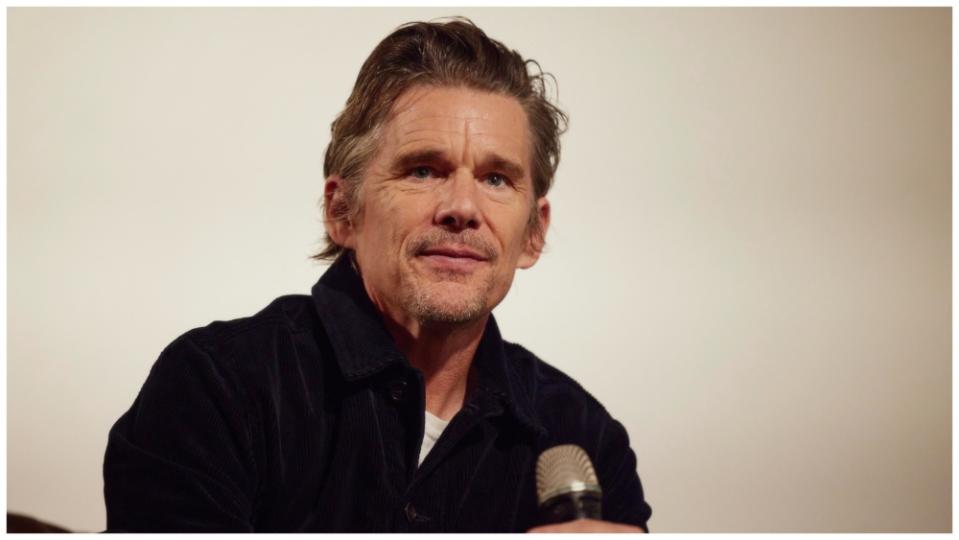Ethan Hawke Talks ‘Wildcat’ at Zurich, Working With Maya: ‘It’s Extremely Easy to Direct Your Own Daughter, Because the Love Is There’

Ethan Hawke opened up at Zurich Film Festival about working with daughter and “Stranger Things” star Maya Hawke on “Wildcat.” “It’s extremely easy to direct your own daughter, because the love is there,” he told the audience.
“When I was making the documentary ‘The Last Movie Stars’ [about Paul Newman and Joanne Woodward], I got to interview Martin Scorsese. I asked: ‘Why do you think Paul survived?’ So many people fall prey to the trappings of celebrity.”
More from Variety
“He gave me a very simple answer: ‘Because of Joanne.’ They worked together all the time. When you work with someone you love, it keeps you close to whatever makes you want to do this in the first place.”
While Hawke ended up directing the film about writer Flannery O’Connor – and co-wrote the script with Shelby Gaines – it was Maya who brought it to him.
“She was 15 or 16 years old when she discovered Flannery O’Connor on her own. She was a young woman growing up in the Jim Crow South, a very turbulent time in American history. She had this arresting mind that I think Maya found very engaging and a lot of insecurity about the nature of ambition. Are you in service of the artform, of the reader or of yourself? Maya found that extremely compelling.”
Later, she “carved a monologue” out of O’Connor’s “A Prayer Journal” and used it for her successful Juilliard audition.
“From that point onward, she began to see her as, for a lack of a better word, a spirit guide. When ‘Stranger Things’ came out and she started to have success, she looked into getting the rights and making a movie about her.”
Then, she approached her father.
“I have a very strong intuition. This time, it said: ‘Do it.’ I don’t get scared until it’s too late. One time, I was playing Macbeth on Broadway and only before I went on stage, I thought: ‘This is a terrible idea’,” he joked. Admitting that O’Connor’s writing appealed to him too.
“She didn’t write populist novels or bestsellers. She was an artist. These books were really born out of the South and the area she was living in.”
As well as her spirituality.
“Flannery was an extremely devout woman and her faith was incredibly important to her. Shortly after I’d done ‘First Reformed,’ I realized that when I was young, I had tremendous interest in spiritual life. I couldn’t believe I was 50 and I haven’t thought about it any more deeply than when I was 21. But it wasn’t entirely true,” he stated.
“I poured all that energy into the arts. When done right, they are a manifestation of our inner life. I started to see [O’Connor’s] work as a springboard to talk about something personal to me too.”
Praising Laura Linney, cast as Flannery’s mother – “It was the best thing I could have done as a director, to invite her in. She is a great leader” – Hawke was also asked to look back at his long and varied career, which started when he was just a teen.
“A lot of children want to perform. They want to be athletes, firemen, actors. They think it’s fun to get attention. I did like it, and then I had this strange storm that came into my life, which was ‘Dead Poets Society’,” he said, recalling the late Robin Williams.
“He was a miracle to be near. The success of that film showed me the power of art. It does make a difference and people are listening if you speak clearly.”
He added: “A few years ago, I got to meet Vanessa Redgrave. I could see that if you do this profession right, you can actually absorb a lot about what it means to be alive. You start to see the world through a lot of different pairs of eyeballs. It’s non-stop education.”

Still, pursuing writing and directing – Hawke is also behind “Blaze” and “Seymour: An Introduction” – was on his mind from the start.
“I stayed connected to wanting to write and direct, because I was so fearful of the parade leaving town. Acting is a challenging lifestyle choice, because you are only as good as your opportunities. I was scared they would take the candy away,” he confessed.
Which is why close collaborations with Richard Linklater, on the beloved “Before” trilogy and “Boyhood,” shot over the course of 12 years, were “really empowering.”
“He really asks you to join him in the process of filmmaking,” he said.
“We went to pitch ‘Boyhood’ to different studios, saying: ‘You won’t make any money on this for 13 or 14 years.’ They all went: ‘I am going to be fired by then.’ It’s actually illegal, because you can’t sign a contract for anything over 7 years in the entertainment business, so there weren’t any contracts. It was a handshake deal!”
But if that already seemed odd, what is happening now is even odder.
“Our whole industry has been on strike, so this is a strange moment. Until the strike is resolved, there is nothing real to speak of,” added Hawke, wary of talking about the future. But he is still looking forward to it.
“My career highlight? Tomorrow.”
Best of Variety
Sign up for Variety’s Newsletter. For the latest news, follow us on Facebook, Twitter, and Instagram.


